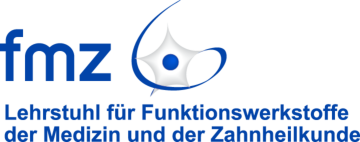The Department for Functional Materials in Medicine and Dentistry is located within the university hospital at the Röntgenring area. Our mission is the development of innovative bio-compatible and bio-active materials for applications in biomedical basic research and applications in humans with focus on regenerative materials and therapies. Our interdisciplinary team of biologists, chemists, pharmacists, and physicists in cooperation with clinicians is engaged in realizing the mission statement ‘higher quality of life through innovative materials’.
Cutting edge material science defines all research areas of the Department for Functional Materials in Medicine and Dentistry. This is reflected in numerous outstanding publications, invited presentations and our global reputation.
Research activities are tailored for the special needs of the respective clinical challenge and divided into the five competence fields; Bioactive Inorganic Scaffolds, Biofabrication, Biology, Hierarchical Systems and NanoBio-Technology. These activities are financially supported by the Volkswagen Foundation, the Deutsche Forschungsgemeinschaft (DFG), the Bundesministerium für Bildung und Forschung (BMBF), the European Research Council (ERC) and the European Union (EFRE Bavaria).
News
- FMZ co-organizing the WI3R – Würzburg Initiative Replace Refine Reduce – Symposium 2024 in Würzburg this June
- Jürgen Groll – appointed Ordinary Member in the German Academy of Science and Engineering
- Topping-out Ceremony for the CPL
- Biomimetic In Vitro Lung Models: Current Challenges and Future Perspective
- Degradation of 3D-printed magnesium phosphate ceramics in vitro and a prognosis on their bone regeneration potential
